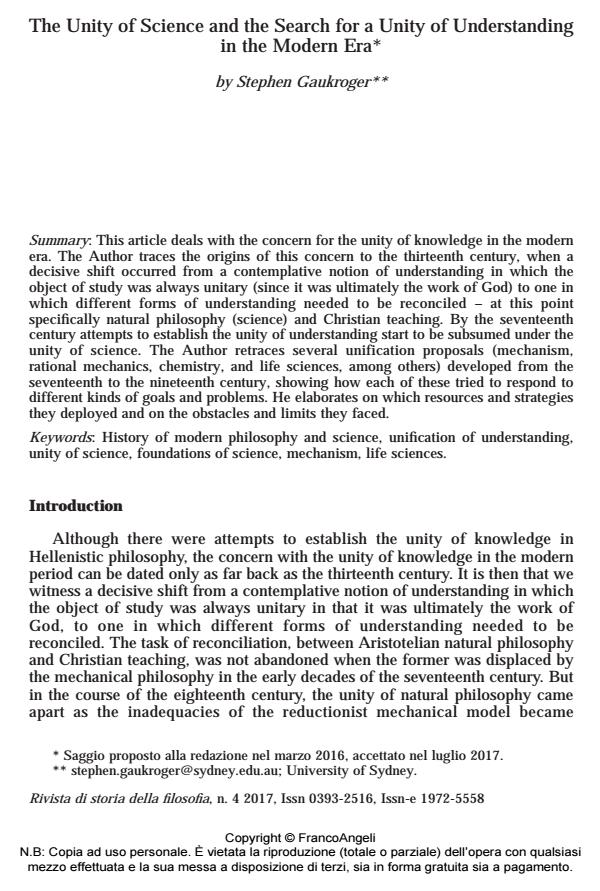The Unity of Science and the Search for a Unity of Understanding in the Modern Era
Journal title RIVISTA DI STORIA DELLA FILOSOFIA
Author/s Stephen Gaukroger
Publishing Year 2017 Issue 2017/4
Language English Pages 21 P. 553-573 File size 72 KB
DOI 10.3280/SF2017-004002
DOI is like a bar code for intellectual property: to have more infomation
click here
Below, you can see the article first page
If you want to buy this article in PDF format, you can do it, following the instructions to buy download credits

FrancoAngeli is member of Publishers International Linking Association, Inc (PILA), a not-for-profit association which run the CrossRef service enabling links to and from online scholarly content.
This article deals with the concern for the unity of knowledge in the modern era. The Author traces the origins of this concern to the thirteenth century, when a decisive shift occurred from a contemplative notion of understanding in which the object of study was always unitary (since it was ultimately the work of God) to one in which different forms of understanding needed to be reconciled - at this point specifically natural philosophy (science) and Christian teaching. By the seventeenth century attempts to establish the unity of understanding start to be subsumed under the unity of science. The Author retraces several unification proposals (mechanism, rational mechanics, chemistry, and life sciences, among others) developed from the seventeenth to the nineteenth century, showing how each of these tried to respond to different kinds of goals and problems. He elaborates on which resources and strategies they deployed and on the obstacles and limits they faced.
Keywords: History of modern philosophy and science, unification of understanding, unity of science, foundations of science, mechanism, life sciences.
- Maupertuis 1756: Pierre-Louis Moreau de Maupertuis, Vénus physique, in Oeuvres de Mr de Maupertuis, nouvelle edition, 4 vols, J-M Bruyset, Lyon 1756.
- Baker 1975: Keith Michael Baker, Condorcet: From Natural Philosophy to Social Mathematics, University of Chicago Press, Chicago 1975.
- Barrow, Tipler 1986: John D. Barrow and Frank J. Tipler, The Anthropic Cosmological Principle, Oxford University Press, Oxford 1986.
- Bitbol-Hespériès 1990: Annie Bitbol-Hespériès, Le Principe de vie chez Descartes, Vrin, Paris 1990.
- Blumenbach 1781: Johann Friedrich Blumenbach, Über den Bildungstrieb und das Zeugungsgeschäfte, Dieterich, Göttingen 1781.
- Bonnet 1948: Charles Bonnet, Mémoires autobiographiques de Charles Bonnet de Genève, ed. Raymond Savioz, Vrin, Paris 1948.
- Bossut 1810: Charles Bossut, Histoire générale des mathématiques depuis leur origine jusqu’à l’année 1808, 2 vols, F. Louis, Paris 1810.
- Carnap 1963: Rudolph Carnap, Intellectual Autobiography, in Paul Arthur Schilpp ed., The Philosophy of Rudolph Carnap, Library of Living Philosophers, La Salle 1963, pp. 3-84.
- Comte 1830-1842: August Comte, Cours de Philosophie Positive, 6 vols, Rouen, Paris 1830-1842.
- Diderot 1753: Denis Diderot, Pensées sur l’interpretation de nature, Garnier, Paris 1753.
- Euler 1957: Leonhard Euler, Recherches sur l’origine des forces, in Leonhardi Euleri opera Omnia, series 2, vol. 5, Orell Füssli, Lausanne 1957.
- Ferreiro 2006: Larrie D. Ferreiro, Ships and Science: The Birth of Naval Architecture in the Scientific Revolution, 1600-1800, The MIT Press, Cambridge 2006.
- Gaukroger 2006: Stephen Gaukroger, The Emergence of a Scientific Culture, Clarendon Press, Oxford 2006.
- Gaukroger 2010: Stephen Gaukroger, The Collapse of Mechanism and the Rise of Sensibility, Oxford University Press, Oxford 2010.
- Hankins 1970: Thomas Hankins, Jean D’Alembert: Science and the Enlightenment, Oxford University Press, Oxford 1970.
- Home 1979: Roderick Weir Home, Aepinus’s Essay on the Theory of Electricity and Magnetism, Princeton University Press, Princeton 1979.
- Humboldt 1793: Alexander von Humboldt, Florae Fribergensis specimen plantas cryptogamicas praesertim subterraneas exhibens, H.A. Rottmann, G.J. Decker, Berlin 1793.
- Jardine 1996: Nicholas Jardine, “Naturphilosophie” and the Kingdoms of Nature, in Nicholas Jardine, James A. Secord, and Emma Spary (eds.), Cultures of Natural History Cambridge University Press, Cambridge 1996.
- Kant 2002: Immanuel Kant, Theoretical Philosophy after 1781, Cambridge University Press, Cambridge 2002.
- Kim 2003: Mi Gyung Kim, Affinity, That Elusive Dream: A Genealogy of the Chemical Revolution, The MIT Press, Cambridge 2003.
- Klein, Lefèvre 2007: Ursula Klein, Wolfgang Lefèvre, Materials in Eighteenth-Century Science: A Historical Ontology, The MIT Press, Cambridge 2007.
- Lagrange 1867-1892: Joseph Louis Lagrange, Oeuvres, 14 vols, Gauthier-Villars, Paris 1867-1892.
- Lohr 1988: Charles Lohr, Metaphysics, in Charles B. Schmitt, Quentin Skinner, and Eckhard Kessler, (eds.), The Cambridge History of Renaissance Philosophy, Cambridge University Press, Cambridge 1988.
- Morgan 1794: George Cadogan Morgan, Lectures on Electricity, 2 vols., J. March, Norwich 1794.
- Renger Karsten 1786-87: Wencelaus Johann Gustav Renger Karsten, Physische-chemische Abhandlung, durch neuere Schriften von hermetischen Arbeiten und andere neue Untersuchungen veranlaßet, 2 vols., Halle 1786-1787.
- Roe 1981: Shirley A. Roe, Matter, Life, and Generation, Cambridge University Press, Cambridge 1981.
- Roger 1971: Jacques Roger, Les sciences de la vie dans la pensée française du XVIIIème siècle, Librairie Armand Colin, Paris 1971.
- Saumarez 1799: Richard Saumarez, On Generation and the Principle of Life, in «Medical and Physical Journal», 2 (1799), pp. 242-247, pp. 321-326.
- Scheele 1780: Carl Wilhelm Scheele, Chemical Observations and Experiments on Air and Fire. With a Prefatory Introduction by Torben Bergman, translated from the German by J. R. Forster, J. Johnson, London 1780.
- Schiemann 2008: Gregor Schiemann, Hermann von Helmholtz’s Mechanism: The Loss of Certainty, Springer, Dordrecht 2008.
- Trembley 1744: Abraham Trembley, Mémoires pour servir à l’histoire d’un genre de polypes d’eau douce, Jean & Herman Verbeek, Leiden 1744.
- Whewell 1831: William Whewell, Modern Science-Inductive Philosophy, in «Quarterly Review» 45 (1831), pp. 374-407.
- Wilson 1992: Curtis Wilson, Euler on Action-at-a-Distance and Fundamental Equations in Continuum Mechanics, in Peter M. Harman and Alan E. Shapiro (eds.), The Investigation of Difficult Things, Cambridge University Press 1992.
- Science and the Shaping of Modernity Charles Wolfe, pp.291 (ISBN:978-3-031-76036-5)
Stephen Gaukroger, The Unity of Science and the Search for a Unity of Understanding in the Modern Era in "RIVISTA DI STORIA DELLA FILOSOFIA" 4/2017, pp 553-573, DOI: 10.3280/SF2017-004002